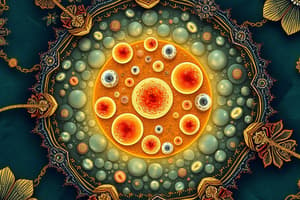Podcast
Questions and Answers
What is an organelle?
What is an organelle?
- A basic unit of all forms of life
- A specialized structure that performs important cellular functions within a cell (correct)
- A rigid structure that protects plant cells
- A group of similar cells that perform a particular function
What is the basic unit of all forms of life?
What is the basic unit of all forms of life?
Cell
What is a tissue?
What is a tissue?
Group of similar cells that perform a particular function
What defines an organ?
What defines an organ?
Prokaryotic cells contain their DNA in a nucleus.
Prokaryotic cells contain their DNA in a nucleus.
What are eukaryotic cells characterized by?
What are eukaryotic cells characterized by?
Animal cells have a cell wall.
Animal cells have a cell wall.
Plant cells have chloroplasts.
Plant cells have chloroplasts.
What is the function of the nucleus in eukaryotic cells?
What is the function of the nucleus in eukaryotic cells?
What do ribosomes do?
What do ribosomes do?
What is the function of mitochondria?
What is the function of mitochondria?
What do chloroplasts convert?
What do chloroplasts convert?
What controls what is allowed to enter or leave the cell?
What controls what is allowed to enter or leave the cell?
What is the function of the cell wall?
What is the function of the cell wall?
What do lysosomes do?
What do lysosomes do?
What does a vacuole store?
What does a vacuole store?
What is the role of the Golgi apparatus?
What is the role of the Golgi apparatus?
What is the endoplasmic reticulum used for?
What is the endoplasmic reticulum used for?
What is the cytoplasm?
What is the cytoplasm?
What is a compound microscope used for?
What is a compound microscope used for?
Flashcards are hidden until you start studying
Study Notes
Cell Basics
- Cells: The fundamental unit of life; all living organisms are composed of cells.
- Tissues: Collections of similar cells that perform a specific function.
- Organs: Composed of multiple tissues working together to carry out related tasks.
Cell Types
- Prokaryotic Cells: Lack a nucleus. Smaller and simpler in structure, primarily found in bacteria.
- Eukaryotic Cells: Contain a nucleus housing DNA. More complex with specialized organelles; examples include animal, plant, fungi, and protist cells.
Organelles and Their Functions
- Organelle: A specialized subunit within a cell with specific functions.
- Nucleus: Stores DNA and regulates cell activities; features pores for molecule exchange.
- Ribosome: Synthesizes proteins by translating RNA into polypeptide chains; essential for producing hormones aiding in homeostasis.
- Mitochondria: Generates ATP by converting sugar into energy; characterized by a folding inner structure.
- Chloroplast: Performs photosynthesis, converting CO2 and water into sugar, exclusively found in plant cells; contains chlorophyll.
- Cell Membrane: Semi-permeable barrier regulating material entry/exit; composed of lipids and proteins, involved in cell signaling.
- Cell Wall: Provides structural support and protection to plant cells; consists of complex carbohydrates.
- Lysosome: Digestive organelle containing enzymes to break down waste and damaged components.
- Vacuole: Storage organelle holding food, water, and waste; particularly large in plant cells.
- Golgi Apparatus: Processes and packages proteins into vesicles for cellular transport.
- Endoplasmic Reticulum (ER): Site of protein folding; rough ER is studded with ribosomes, indicating protein synthesis.
- Cytoplasm: Gel-like fluid facilitating the movement of materials and organelles, containing salts and nutrients for cellular function.
Microscopes
- Compound Microscope: Tool for examining microscopic objects not visible to the naked eye, essential for cell study.
Studying That Suits You
Use AI to generate personalized quizzes and flashcards to suit your learning preferences.




